If war is a crime what is its name? The Constitution of the United States of America calls it “Treason.”
According to Wikipedia, the Free Encyclopedia, September 28, 2011, “Richard Allen Posner” is “an America jurist and legal theorist who is currently a judge on the United States Court of Appeals Judge for the Seven Circuit in Chicago and a Senior Lecturer at the University of Chicago Law School. He is an influential figure in the law and economics school of thought. Posner has been called ‘the world’s most distinguished legal scholar.’ He is the author of nearly 40 books on jurisprudence, legal philosophy, and several other topics, including The Problems of Jurisprudence, Sex and Reason, Overcoming Law, Law, Pragmatism and Democracy, and The Problems of Moral and Legal Theory. The Journal of Legal Studies has identified Posner as the most cited legal scholar of the 20th century, and a 1999 New York Times article identified Posner as one of the most respected judges in the United States.”
In the first sentence of his book How Judges Think (Harvard University Press, 2008), Justice Posner says, “Traditional legal thinkers are likely to say that if legalism (legal formalism, orthodox legal reasoning, a ‘government of laws not men,’ the ‘rule of law’ as celebrated in the loftiest Law Day rhetoric, and so forth) does not exist everything is permitted to judges—so watch out! Legalism does exist, and so not everything is permitted. But its kingdom has shrunk to the point where today it is largely limited to routine cases, and so a great deal is permitted to the judges. Just how much is permitted and how they use their freedom are the principle concerns of this book.” On page 369 Posner concludes, “So judging is political.”
Constitution, Article VI, ¶2. “This Constitution, and the Laws of the United States which shall be made in Pursuance thereof; and all Treaties made, or which shall be made, under the Authority of the United States, shall be the supreme Law of the Land; and the Judges in every State shall be bound thereby, any Thing in the Constitution or Laws of any State to the Contrary notwithstanding.” Article VI, ¶3. “The Senators and Representatives before mentioned, and the Members of the several State Legislatures, and all executive and judicial Officers, both of the United States and of the several States, shall be bound by Oath or Affirmation, to support this Constitution; but no religious Test shall ever be required as a Qualification to any Office or public Trust under the United States.”
Judges are not to invent law but rather to apply law. The politicians invent it. That’s how a constitutional democracy works when it works. But apparently an eminent judge openly can say and, remain celebrated after having said it, that judges think politically when making decisions, even though the principle of constitutional supremacy upon which constitutional democracy is based requires the application of the constitutional truth to affairs absolutely without regard for the political consequences, those being a matter for the People to address by amending their constitution or for the politicians when drafting the laws.
How can lawyers’ minds accommodate such double think? Well, consider the modes of analysis identified by “Laurence Henry Tribe” of whom Wikipedia, September 28, 2011, says:
[He is] a professor of constitutional law at Harvard Law School and the Carl M. Loeb University Professor at Harvard University. He also works with the firm Massey & Gail LLP on a variety of matters. Tribe is widely recognized as a leading liberal scholar of constitutional law. He is the author of American Constitutional Law (1978), a treatise in that field, and has argued before the U.S. Supreme Court 35 times. Tribe was born in Shanghai to parents of Eastern European Jewish descent. He attended Abraham Lincoln High School in San Francisco, California. He holds an A.B. in mathematics, summa cum laude from Harvard College (1962), and a J.D., magna cum laude from Harvard Law School (1966), where he was a member of the Harvard legal Aid Bureau. Tribe was a national champion policy debater at Harvard, and later a college coach and high school summer institute teacher. Tribe served as a law clerk to Matthew Tobriner on the California Supreme Court from 1966–67, and as a law clerk to Potter Stewart of the U.S. Supreme Court from 1967–68. He joined the Harvard Law School faculty as an assistant professor in 1968, receiving tenure in 1972. In addition to his record as a scholar, Tribe is noted for his extensive support of liberal legal causes. He is one of the co-founders of the liberal American Constitution Society, the law and policy organization formed to counter the conservative Federalist Society, and is one of a number of scholars at Harvard Law School who have expressed their support for animal rights. He has argued many high-profile cases, including one for Al Gore during the disputed U.S. presidential election, 2000. The U.S. Supreme Court ruled against Tribe’s client in Bowers v. Hardwick in 1986, holding that a Georgia state law criminalizing sodomy, as applied to consensual acts between persons of the same sex, did not violate fundamental liberties under the principle of substantive due process. However, he was vindicated in 2003, when the Supreme Court overruled Bowers in Lawrence v. Texas. He wrote the ACLU’s amicus curiae brief supporting Lawrence, who was represented by Lambda Legal. Tribe also represented General Electric in its defense against its liability under Comprehensive Environmental Response, Compensation and Liability Act (‘Superfund’), in which GE and Tribe unsuccessfully argued that the act unconstitutionally violated General Electric’s due process rights. He actively supported the candidacy of President Barack Obama and described Obama as ‘the best student I ever had,’ a phrase he also used to describe Kathleen Sullivan. Alongside Harvard’s Cass Sunstain, Tribe served as judicial adviser to Obama’s campaign. In February 2010, he was named ‘Senior Counselor for Access to Justice’ in the Department of justice. He resigned this position, citing health reasons in November 2010. In 2004, Tribe admitted that material he published in 1985 was closely similar to material originally published by Henry J. Abraham in 1974. Some sentences were identical. After an investigation headed by former Harvard President Derek Bok, Tribe was reprimanded by Harvard President Lawrence Summers and Law School Dean Elena Kagan for ‘a significant lapse in proper academic practice’, but they concluded that Tribe’s error was unintentional.
What a curriculum vitae! In his chapter entitled “The Variable Role of Interpretive Judicial Precedent” in The Invisible Constitution (Oxford University Press, 2008), Tribe says:
Thus, although it may seem counterintuitive, the great difficulty of formally amending the Constitution to overturn a Supreme Court interpretation of its meaning, something our nation has done just four times in its history, in contrast to the relative ease of formally amending an act of Congress for such a purpose, has led to a practice in which judicial interpretations of the Constitution tend—with the exception of certain ‘superprecedents’ of the sort we will shortly encounter—to be more amendable than judicial interpretations of federal statutes to revision in subsequent judicial decisions. Although a handful of Supreme Court decisions have attained status as ‘superprecedents’ that it would be unthinkable for any subsequent Court to overrule virtually no Supreme Court ruling besides Brown—with the possible exception of the decision that is regarded as having permanently established the power of judicial review, Marbury v. Madison—has achieved a status essentially comparable to that of the Constitution itself.
Marbury v. Madison, 5 US 137, 163, 177-78 (1803) famously settled, “The government of the United States has been emphatically termed a government of laws, and not of men. It will certainly cease to deserve this high appellation, if the laws furnish no remedy for the violation of a vested legal right.… [And] It is emphatically the province and duty of the Judicial Department to say what the law is. Those who apply the rule to particular cases must, of necessity, expound and interpret that rule. If two laws conflict with each other, the Courts must decide on the operation of each. So, if a law be in opposition to the Constitution, if both the law and the Constitution apply to a particular case, so that the Court must either decide that case conformably to the law, disregarding the Constitution, or conformably to the Constitution, disregarding the law, the Court must determine which of these conflicting rules governs the case. This is of the very essence of judicial duty. If, then, the Courts are to regard the Constitution, and the Constitution is superior to any ordinary act of the Legislature, the Constitution, and not such ordinary act, must govern the case to which they both apply. Those, then, who controvert the principle that the Constitution is to be considered in court as a paramount law are reduced to the necessity of maintaining that courts must close their eyes on the Constitution, and see only the law. This doctrine would subvert the very foundation of all written constitutions. ((p. 15, 19.))
In spite of Marbury v. Madison, The Invisible Constitution’s chapter entitled “Organizing the Constitution’s Dark Matter” explains that just as the physical universe is 95% dark matter and energy about which humans little, so also is the Supreme Court’s interpretation of the constitution dark. Tribe says:
THAT THERE IS MORE ‘out there’ than is encompassed in constitutional text, and that much of what is out there nonetheless counts as part of our Constitution, now seems plain enough. What remain to be addressed are the processes by which we might best visualize and articulate the rules, principles, and rights that are part of our Constitution but are not discernable in or directly derivable from portions of its text.…I would identify six distinct but overlapping modes of construction in forming the invisible Constitution: geometric, geodesic, global, geological, gravitational, and gyroscopic.…Here are my drawings—one for each of the six ways of constructing the invisible Constitution—presented as I created them rather than in a professional rendition, in the belief that any reduction in clarity will be more than offset by the gains in vibrancy and immediacy. ((p. 155.))
TO WIT:
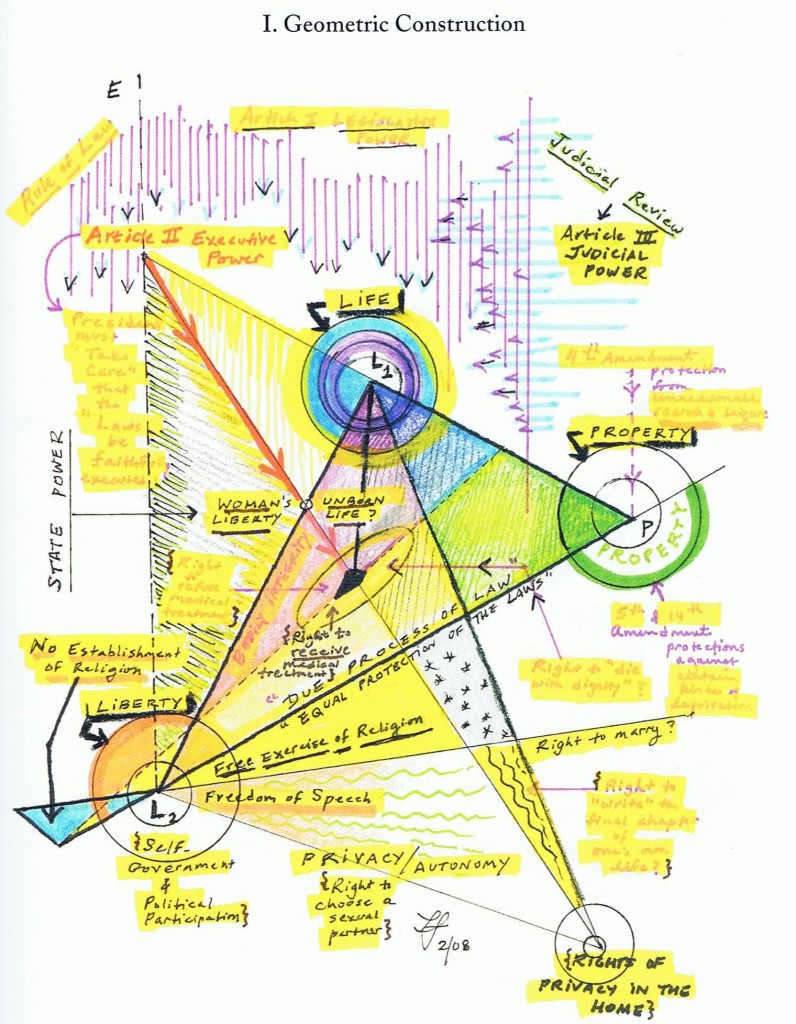
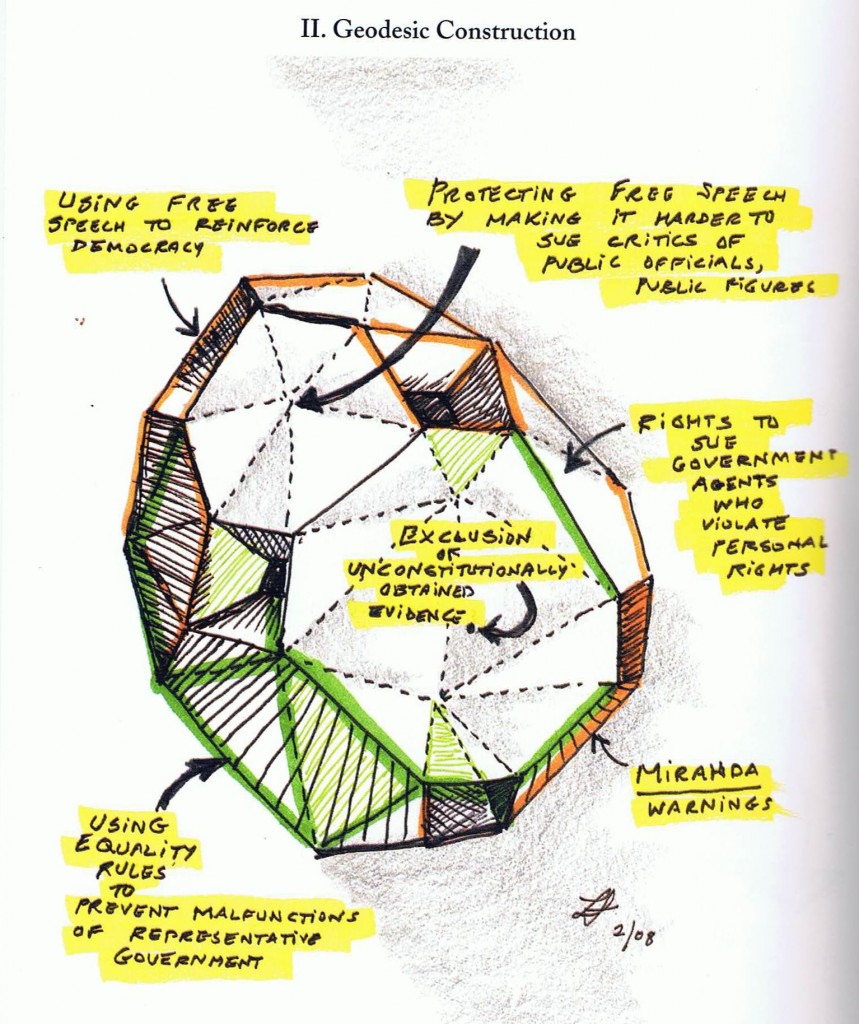
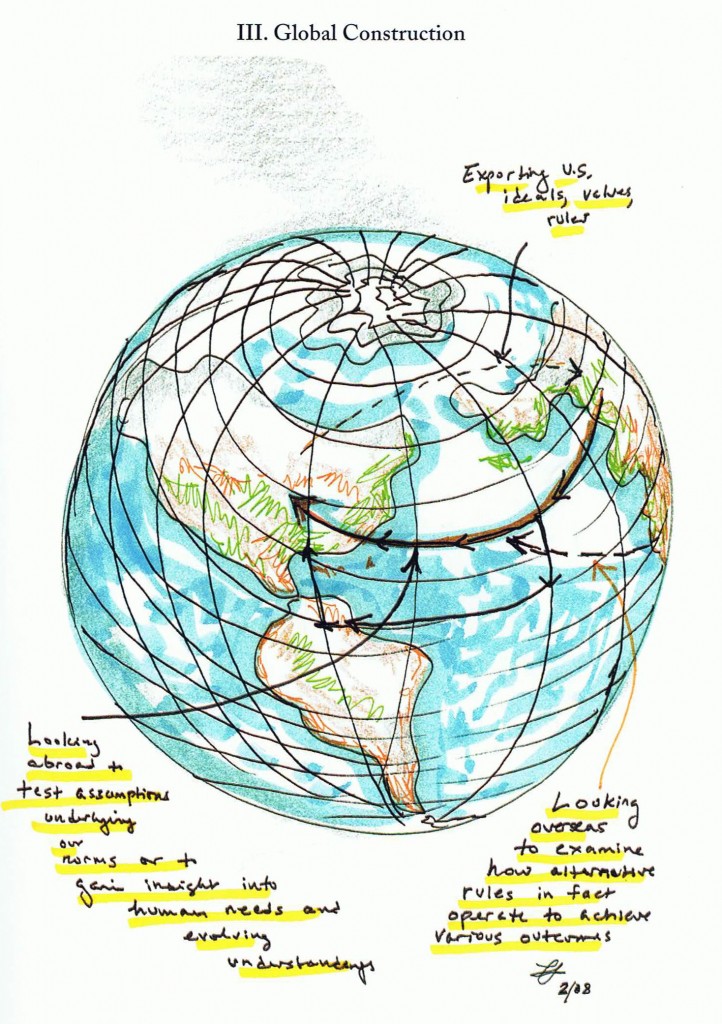
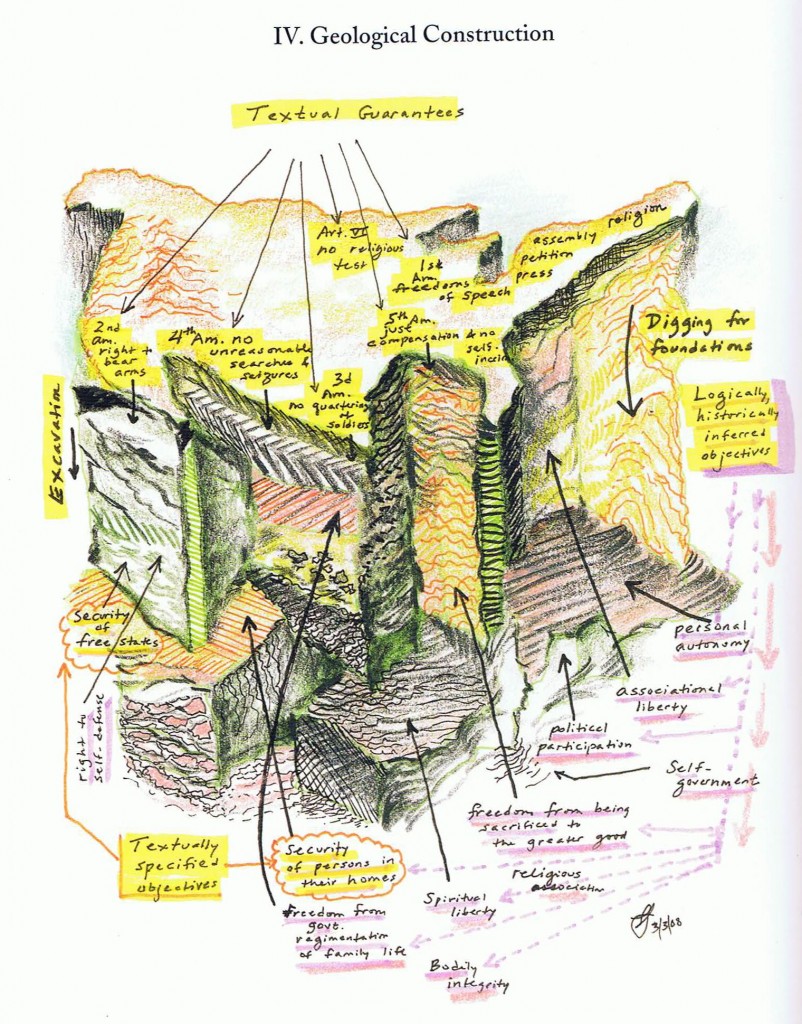
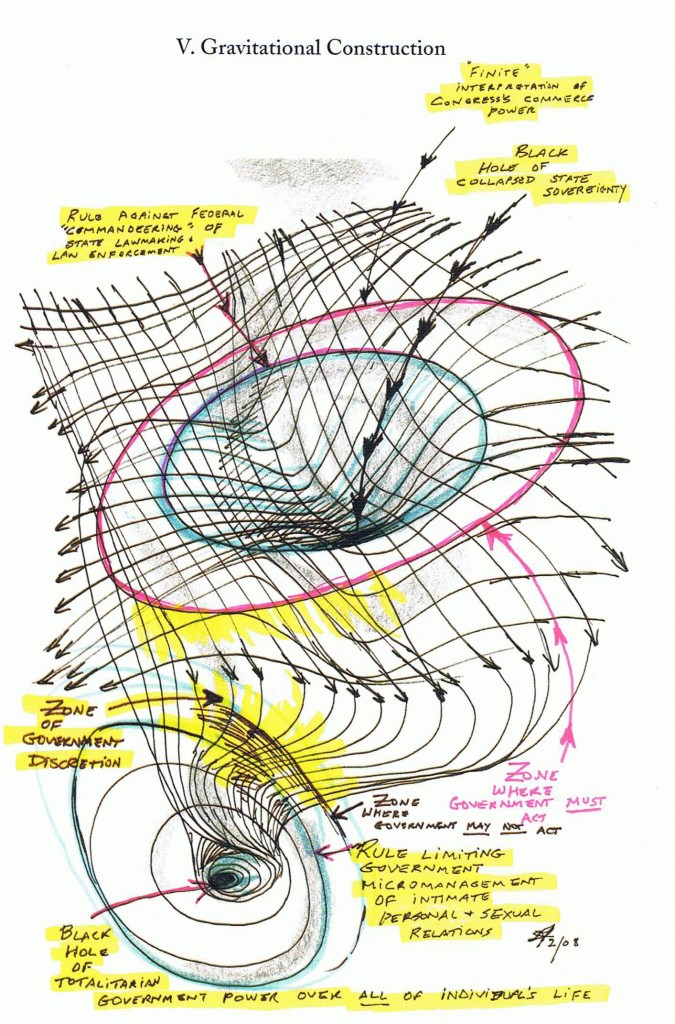
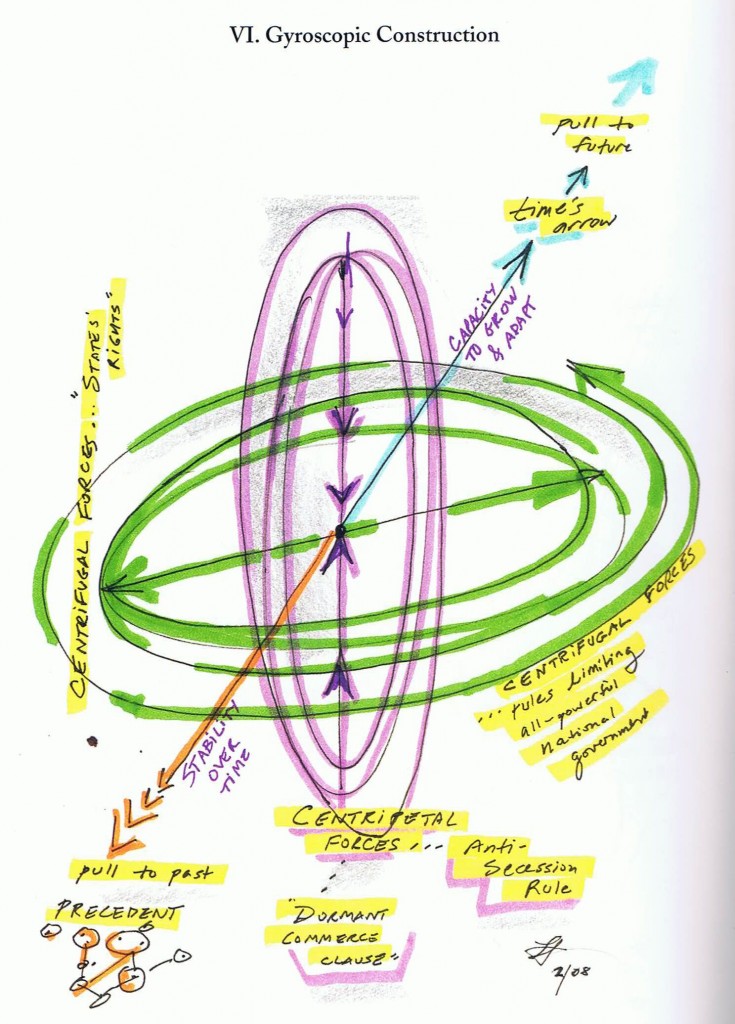
It is no wonder the constitution is a field of dark matter encased in dark energy, dare one say the natural complexion of unconstitutional empire, since while thinking politically the judges are interpreting the constitution and the statutes not on the basis of what their words say but instead on the basis of Tribe’s modes of judicial construction: I Geometric Construction, II Geodesic Construction, III Global Construction, IV Geological Construction, V Gravitational Construction and VI Gyroscopic Construction.
An unconstitutional empire has displaced the constitutional democracy due to the chicanery of “how judges think.” They abrogate the principle of constitutional supremacy that is the sine qua non of constitutional democracy. In consequence constitutional democracy’s supreme law of peace based upon respect for the territorial sovereignty of foreign Nations and Indian tribes as implemented by the commerce, defence and treaty clauses is superseded by their unconstitutional empire’s diametrically opposed policy of perpetual wars based upon contempt for their territorial sovereignty.
Judicial thinking needs to re-start where it left off in 1871, at the end of the era 1789-1871 when the words of the constitution and the statutes whose compliance judicially is being measured are what the judges read. For construction they make do with a good dictionary ready to hand. The construing of the straightforward language employed by the constitution’s draftsmen in 1789 was basically finished before 1871, in which year the Appropriation Act of 1871 purported to abrogate Indian tribal sovereignty without troubling to comply with Article V, the Amendment Clause, for which reason the statute patently is null and void ab initio.
Correspondingly the tribes rely upon the constitutional protection of Indian tribal sovereignty as it was in 1871 and remains today, and seek a declaration from the Supreme Court of the United States as the constitutionally stipulated independent and impartial third-party adjudicator constituted by Article III, §2, ¶2, the Original Jurisdiction Clause, specifically for the resolution of territorial sovereignty and boundary disputes “with foreign Nations, and among the several States, and with the Indian Tribes.” That clause recognizes that when sovereign bodies politic dispute the court system of each is disqualified from adjudicating since none is a third-party to the dispute. In contrast the Supreme Court is beholden to no one of the disputants, deriving its jurisdiction not by grant from any of them but rather directly from the constitution itself which is beyond the legislative reach of any.
But is the judicial branch’s obstruction and ignoring actually a crime and if so is it Treason? If war and genocide in consequence of war are criminal then causing those crimes is itself a crime. War itself is constitutionally beyond the power delegated to the government except in self defence to repel an invasion, and no Indian tribe or foreign Nation currently is an invader of the United States or any of its allies Canada, France, Netherlands, Portugal, Spain, Russia, United Kingdom and United States. Yet war and genocide by the American empire is normal and prevalent all round the globe. But still, is it actually criminal in addition to being unconstitutional?
Article III, §3, ¶1 enacts, “Treason against the United States, shall consist only in levying War against them, or in adhering to their Enemies, giving them Aid and Comfort.” An ordinary reading of “levying War against them” means an invasion by force of arms. The Court Clerk and the Judges of the Supreme Court of the United States do not invade the United States, only Indian tribes and foreign Nations. So the phrase “levying War” is not relevant. What about “adhering to their Enemies, giving them Aid and Comfort?”
Certainly, if the word “Enemies” subsumes persons who swear or affirm allegiance to the constitution pursuant to Article VI, ¶¶2&3, but then obstruct and ignore the constitutional question of jurisdictional law alone of Indian tribal sovereignty to evade having to declare unconstitutional and void the Appropriations Act of 1871, 25 USC §71¶1 and 28 USC §1251¶(b)(1), then the Judges are “Enemies.”
Certainly they give “Aid and Comfort” to the unconstitutional empire in whose nature and character it is to commit war and genocide against Indian tribes and foreign Nations, for the economic advantage of confiscating their lands and resources. Since the life of the unconstitutional empire depends upon the death of the constitutional democracy, the judicial blindness is of mortal consequence.
So all in all it appears causing unconstitutional war and genocide is a crime; the crime is Treason and, last and most important, the judges can exonerate themselves by and only by voluntarily ceasing to be political in the performance of their judicial duty to uphold the constitution. This has nothing to do with prosecuting Clerks or Judges. Prosecution is about punishment and what matters is not vengeance for what is past, but prevention for the future.
The Judges are the only ones who can achieve prevention without violence. A jurisprudential revolution can prevent war and genocide simply by thinking judicially instead of politically. Specifically, the Mahican and Mi’kmaq Tribes seek a simple declaration the Appropriation Act of 1871 is ultra vires [beyond the constitutional jurisdiction delegated by] the defence, commerce and treaty clauses and their precedents. Such as this is precisely the purpose of the Constitution’s original jurisdiction clause that vests exclusively in the US Supreme Court the independent and impartial third-party court jurisdiction. It is the only court whose jurisdiction is beyond the power of any of the competing sovereign governments, precisely because it is the only constitutional court. Every other court labors under a conflict of interest that disqualifies it due to apprehension of bias in favor of its own government. Only the US Supreme Court is a creature of no government.
But in order to permit the Justices to fulfill their duty it is first necessary to remove the Clerk from office for refusing to do his duty. He wilfully obstructs the constitutional challenge to the Appropriation Act of 1871, 25 USC §71¶1 and 28 USC §1251¶(b)(1) on the ground of that legislation is immune from being constitutionally challenged. The Clerk is taking it upon himself to overrule Marbury v. Madison by permitting a federal statute to exempt itself from constitutional compliance. And that, precisely, is what Marbury v. Madison identified as, “This doctrine would subvert the very foundation of all written constitutions.”
The Clerk’s obstruction of the Indian sovereignty case also aids and abets the unconstitutional empire’s wars and genocides in abrogation of the sovereignty of foreign Nations. The War Powers Act of 1973 does the same with regard to foreign Nations as the Appropriation Act of 1871 does with regard to Indian tribes. Both manifestly and equally breach the commerce, defence and treaty clauses and their constitutive precedents. Both are justified if at all upon willfully reading the commerce clause jurisdiction to regulate trade “with” those entities as if it means a “plenary power” “over” them. The blindsided commerce, defence and treaty clauses and their precedents put paid to that nonsense, which no doubt is why the Clerk is stonewalling the Indian Case based entirely upon that law alone.
The Clerk’s obstruction of the constitution establishes the ascendancy of the unconstitutional empire of war and genocide over the constitutional democracy of peace and goodwill. The full name of the blocked Case is Mahican Tribe and Rick Vanguilder and Mi’kmaq Tribe and Gary Metallic v. Canada, France, Netherlands, Portugal, Spain, Russia, United Kingdom and United States. It can be examined at mightisnotright.org/ and the tribes’ Letter for the Removal of the Clerk is Document 19 of the Case Court Documents at that website, or can be viewed at the Internet link Supreme Court re Court Clerk.










